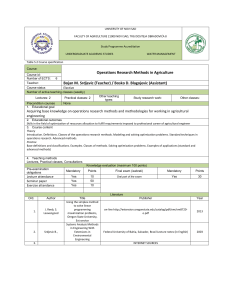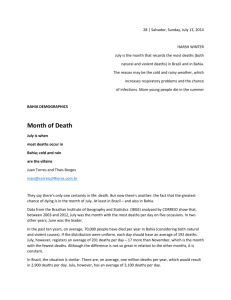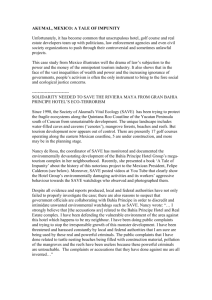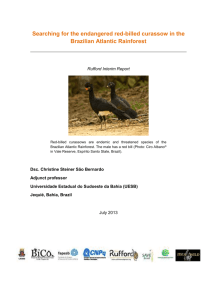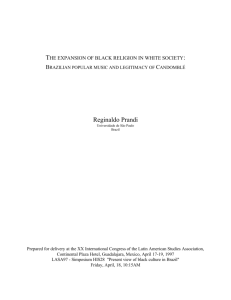PROJECT INFORMATION DOCUMENT (PID)
advertisement
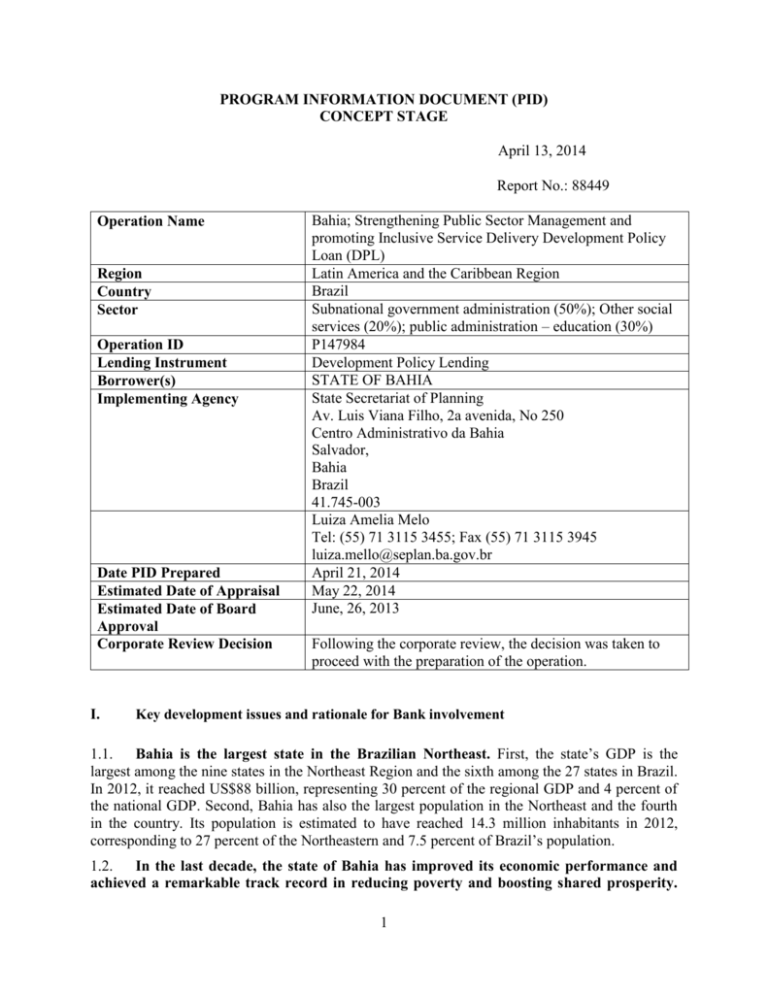
PROGRAM INFORMATION DOCUMENT (PID) CONCEPT STAGE April 13, 2014 Report No.: 88449 Operation Name Region Country Sector Operation ID Lending Instrument Borrower(s) Implementing Agency Date PID Prepared Estimated Date of Appraisal Estimated Date of Board Approval Corporate Review Decision I. Bahia; Strengthening Public Sector Management and promoting Inclusive Service Delivery Development Policy Loan (DPL) Latin America and the Caribbean Region Brazil Subnational government administration (50%); Other social services (20%); public administration – education (30%) P147984 Development Policy Lending STATE OF BAHIA State Secretariat of Planning Av. Luis Viana Filho, 2a avenida, No 250 Centro Administrativo da Bahia Salvador, Bahia Brazil 41.745-003 Luiza Amelia Melo Tel: (55) 71 3115 3455; Fax (55) 71 3115 3945 luiza.mello@seplan.ba.gov.br April 21, 2014 May 22, 2014 June, 26, 2013 Following the corporate review, the decision was taken to proceed with the preparation of the operation. Key development issues and rationale for Bank involvement 1.1. Bahia is the largest state in the Brazilian Northeast. First, the state’s GDP is the largest among the nine states in the Northeast Region and the sixth among the 27 states in Brazil. In 2012, it reached US$88 billion, representing 30 percent of the regional GDP and 4 percent of the national GDP. Second, Bahia has also the largest population in the Northeast and the fourth in the country. Its population is estimated to have reached 14.3 million inhabitants in 2012, corresponding to 27 percent of the Northeastern and 7.5 percent of Brazil’s population. 1.2. In the last decade, the state of Bahia has improved its economic performance and achieved a remarkable track record in reducing poverty and boosting shared prosperity. 1 Between 2002 and 2012, average household per capita income in Bahia grew at an annual rate of 4.8 percent, well above the national average of 3.3 percent. As a result, moderate and extreme poverty declined sharply in the same period, dropping from 43.4 percent to 18 percent and 18.4 percent to 7.5 percent, respectively1. Moreover, the income of the bottom 40 percent increased rapidly at 6.9 percent annually (1.9 percentage points higher than the growth rate of the average income), increasing their share in total income from 8 to 11 percent in 2012. Income inequality fell as well, with the Gini coefficient falling from 0.6 to 0.55 in this period. 1.3. Nonetheless, Bahia still lags behind national averages and continues to be the state with the largest absolute number of poor and extreme poor in the country. In 2011, Bahia’s registered a per capita GDP of US$5,920, higher than the regional average of US$5,437 but well below the national GDP per capita of US$11,235. Indeed, Bahia’s per capita GDP nineteenth in the country. Bahia’s poverty rate is almost twice the national moderate poverty rate (9.5 percent) and its extreme poverty rate is 75 percent higher than the national one (4.3 percent). Large population and relatively higher poverty rates make Bahia the state with the largest population below the moderate and extreme poverty lines in the country, 2.6 million and 1.1 million respectively, which in both cases, corresponds to around 25 percent of the poor and extreme poor in the Northeast and 14 percent of the poor and extreme in Brazil. 1.4. The proposed operation is designed to support the implementation of the GoBA PPA-P. In accordance to the GoBA priorities and the areas of intervention defined in the PPA-P, this operation focuses the Bank’s support on the first pillar (Social Inclusion and Affirmation of Rights) and the third pillar (Democratic Management of the State). The proposed operation is structured in two programmatic pillars: (i) Public Sector Management and (ii) Inclusive Service Delivery. II. Proposed Objective(s) The development objective of this operation is to assist the GoBA in strengthening public sector management, governance and the delivery of services in education, health, public security with a particular attention to the inclusion of women, afro-descendants, indigenous population, youth and LGBT and promote their social and economic inclusion. III. Preliminary Description 1.5. This proposed DPL seeks to assist the GoBA in the implementation of its policy reform agenda directed to strengthening cross-cutting aspects of public sector management that are critical for the improvement of service delivery and key sector policies to make services more inclusive. In particular, it will support the implementation of critical public-sector management reforms including improvements in the GoBA ability to collect taxes, more transparent social security policies, enhanced institutional framework for multi-sector and territorial policies, and the introduction of performance-based remuneration in the public security sector. The operation also supports actions in education, health, public security and productive inclusion to ensure access of women, afro-descendants and other minorities to these services as 1 National unofficial moderate and extreme poverty lines are R$140/month and R$70per month. 2 well as tailoring them to serve their specific needs. This operation succeeds the first Bahia development policy operation, which was fully disbursed at the end of 2013, and aims to consolidate previous achievements, and expand on recently adopted inclusive policies, ensuring the sustainability of the reforms through the next State administrative term in 2015-18. IV. Poverty and Social Impacts and Environment Aspects Poverty and Social Impacts The policy reforms supported by this loan are expected to contribute positively to reduce poverty and income inequality in Bahia. The poor, extremely poor and most vulnerable social groups may have the most positive gains from reforms in the delivery of public services. The potential pro-poor effects of DPL supported policy reforms will be firstly felt as a result of improvements in the access and quality of education, health services and the policies designed to promote productive inclusion, to control crime and violence, and to mainstream gender and to fight gender based violence. Environment Aspects The specific actions supported under the proposed operation are not likely to have significant positive or negative effects on the state or country's environment, forests, fisheries or other natural resources. The first pillar, Strengthening Public Sector Management, has a primarily administrative nature, therefore policy actions under the first pillar are unlikely to either exacerbate environmental problems or contribute to their remediation. The second pillar, Promoting More Inclusive Service Delivery, encompasses policy actions focused on social sectors that are expected to have very limited if any implications on environmental sustainability. A policy action that could have potential environmental impact is the establishment of the guarantee fund for PPPs which is expected to foster private sector participation in public infrastructure investments. Nonetheless, Bahia has a comprehensive regulatory framework for public investments projects that turn mandatory environmental impact studies and has adopted regulations which ensure that environmental norms are also applied for PPPs projects. V. Tentative financing ($m.) 0 Source: RECIPIENT International Development Association (IDA) Borrower/Recipient IBRD Others (specify) 400 Total 3 400 VI. Contact point World Bank Contact: Fernando Andres Blanco Cossio Title: Lead Economist Tel: (202) 458-5075 Email: fblanco@worldbank.org Borrower Contact: Luiza Amelia Mello State Secretariat of Planning (SEPLAN) Praia Salvador, Bahia – Government’s Administrative Center Tel: (55) 71 3115 3455 Email: luiza.mello@seplan.ba.gov.br VII. For more information contact: The InfoShop The World Bank 1818 H Street, NW Washington, D.C. 20433 Telephone: (202) 458-4500 Fax: (202) 522-1500 Web: http://www.worldbank.org/infoshop 4

